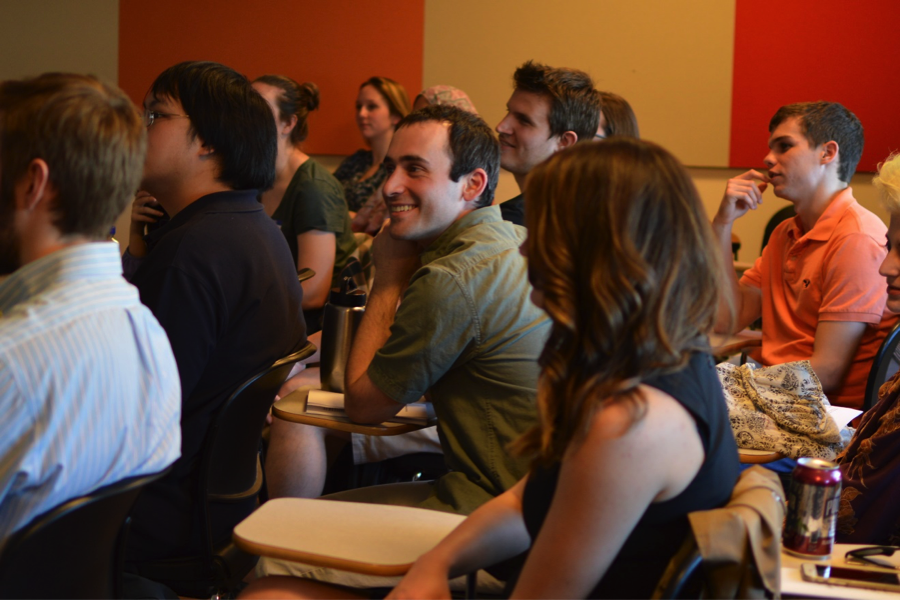By Abigail Epplett, M.A. student in Museum Education
As an undergraduate, you likely had classes that were taught in part by a teaching assistant or TA. They were most likely a graduate student who took courses at your university or from a nearby program. Maybe you thought you’d like to have that job someday. Now that you’re a grad student, you have the opportunity to fulfill that dream! I’m going to talk about my TA experience in the Civics Special Topics course, “Tweets, TikTok, and Talking Points: Modern Political Communications and Message Development.” I’ll also give you some tips on how to be a great TA, and to inspire undergrad students in the same way you were inspired years ago.
Getting the Job

Typically, TA jobs are referred to graduate students by their department to assist with undergraduate classes in that department. However, some departments and programs do not have undergraduate equivalents, as is the case for my branch of Museum Studies, Museum Education. Likewise, some interdisciplinary programs or departments do not have graduate programs. This is the case for Civics Studies classes at Tufts, as they are often cross-listed with courses in political science, philosophy, or history. Although I do have a wide breadth of knowledge on American civics and public policy due to my background in studying American history, my experience with Canvas, Zoom, and other online platforms makes me an ideal person for the job.
TAs may also be required to attend a TA orientation at the beginning of their job, typically at the beginning of the Fall semester. Because I was a last-minute hire in the Spring, I did not attend an orientation. However, I did attend a weeklong workshop called, “The Graduate Institute for Online Course Design.” This was an excellent bootcamp for learning how to lead a class and design lessons in a virtual environment. I highly recommend this type of workshop for any TA and anticipate that it will be offered again.
What does a TA do?
This brings us to the next important thing to note about being a TA. The job requirements vary widely depending on the class where you are assisting. However, many positions have the same characteristics. Here is a short list of things I do as a TA for the civics course:
- Send emails to the professors, students, and guest speakers
- Host and record classes via Zoom
- Set up, organize, and maintain the Canvas website
- Upload files, such as documents and videos, onto Canvas
- Meet individually with students who need assistance on projects
- Assist Civic Studies staff members as needed
TA Tips
Unless you were an education major or minor as an undergrad, you might not have any experience leading a class. Don’t worry about this! The professor or professors teaching the class have already shown confidence in your abilities by hiring you, and you will learn a lot as you work. Here are some tips to aid in your learning.
Communication is Key
You’ve heard this and you know this, but it is worth saying again that communication is extremely important. You need to make sure you stay in contact with the professors, students, and staff members. If you cannot be contacted for an extended period of time — you have the right to take the weekend off! — make sure to set this expectation ahead of time. My rule of thumb is to respond to emails, Canvas mail, calls, or any other method of communication within 24 hours to any email sent during the business week. Even if you cannot fully answer a question or complete an assignment within that time period, you are still acknowledging contact and reassuring the initial sender that you are working on the issue. Not every person that you work with will maintain this standard, but this level of prompt response will set you apart and lead to positive recommendations. If communication is not your strong suit, GSAS offers workshops throughout the year that will help you to improve these skills, along with aiding in personal development and leadership, among many other topics.
Canvas as an Instructor
Canvas is the platform Tufts uses to hold course information. Students can use Canvas to connect to Zoom classes, read the syllabus, post to discussions, download weekly readings, upload assignments, email classmates and professors, and complete a seemingly endless number of other tasks. Despite its many positive attributes, a Canvas course page can appear chaotic, with countless links and modules to explore. This chaos is exponentially increased on the instructor side of the program, and the system can be overwhelming.
However, Canvas does have an extensive online manual that explains how to use the many features and add-ons in the program as an instructor. Use this manual to better understand the function of different parts of Canvas. You should also consider “disabling” unused features to hide them from the student view. The large number of links on the left side of the page can be distracting and confusing for undergrads. Minimizing the number of options will allow them to have a more straightforward and relaxing experience.
Be Flexible and Willing to Help
The tasks of teaching and learning during a “regular year” are hard enough, but teaching and learning during social distancing restrictions are even harder. Changes to schedules, cancelled Zoom meetings, lost internet connections, and assignment extensions are all part of the new normal. As a TA and graduate student,, you’re in a great place to understand what both professors and students are going through. Make sure that the people associated with your class know when you are available to help, whether a professor needs assistance with grading, a student wants to go over an assignment, or department staff members have additional projects outside of class needs. If you are paid hourly as a TA, you are eligible for up to ten hours of work each week. If you have the time to help your department, you will also be able to maximize your payment.

Perks of Being a TA
Payment
As I mentioned before, TAs are paid for their time, whether they are assisting with a class or helping the department. You will need to complete paperwork and an online onboarding questionnaire before you can get paid. You will also need to submit your hours every week to a supervisor.
Audit a Class for Free!
While this may not be as exciting if you have already taken the class, I find the civics course to be a fun way to learn about modern political communication without the stress of assignments and grades.
Meeting Guest Speakers
Not all classes have guest speakers, but some have a weekly lineup. In the case of the civics course, I get to communicate with many guest speakers and their assistants in the weeks prior to the class, along with watching their presentation during the class. It’s exciting to meet people in a field that holds my interest.
Conclusion
Having a TA position is a great experience for a grad student. You’ll learn how to manage a class, help out your department, learn new things, meet amazing people, and get paid while doing it. As long as you remember to stay open to changes, maintain communication, and view the opportunity as an experience to grow, this job will have a positive impact on both your grad school experience and your career path.



